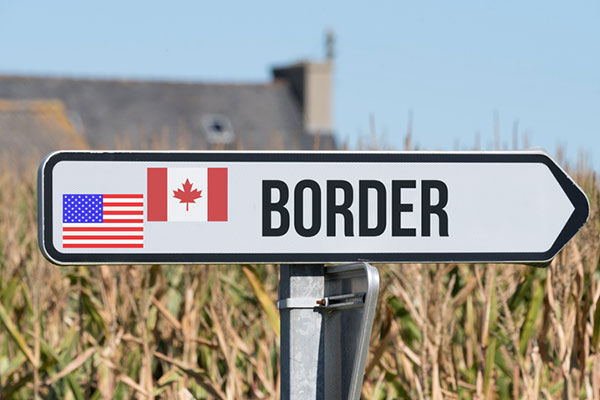Ongoing updates: Temporary flexibilities in labelling and cross-border transit due to B.C. supply chain issues
November 23, 2021
Since November 17, 2021, flooding in B.C. has caused numerous washouts that have resulted in challenges to the transportation of goods. In the interim, the Canadian and American governments have adjusted by allowing for certain flexibilities in labelling and cross-border transit.
Bookmark this page and check back for regular updates as the situation evolves. Further information on highway and rail closures can be found here.
Updated November 24, 2021
Emergency declaration granted to Canadian motor carriers and drivers transiting essential goods through the U.S.
Canadian motor carriers and drivers ((holding class 1, 2 and 3 licenses) who are providing transportation of essential goods, supplies, and equipment from Canada to other points in Canada can temporarily transit through the United States without a US DOT#, provided they hold a valid National Safety Code (NSC) certificate number issued by the appropriate authority in the base jurisdiction and a proof of registration in Canada, and have not been assigned a Conditional or Unsatisfactory safety rating by their base jurisdiction. Under the emergency declaration, the Federal Motor Carrier Safety Association (FMCSA) will not enforce specific parts of the Drug and Alcohol Testing Regime and Clearing House.
Direct assistance includes the transport of essential goods, supplies, and equipment, but does not include routine commercial deliveries, including mixed loads with a nominal quantity of qualifying emergency relief added. It also does not apply to Canadian motor carriers picking up or delivering loads in the United States.
Labelling Exemptions for Food
Further to RCC’s request last week, CFIA has posted a notice on labelling exemptions for food, including products originating from outside Canada, to help with supply chain challenges.
The notice provides flexibility for non-food safety labelling and packaging requirements, so long as the information can be made available to the purchaser, but with a broader scope of application, namely:
• Milk
• Baby food and formula
• Meat
• Fresh produce
• Bottled water
• Eggs
• Canned foods
• Dry pasta
The notice will expire on December 31, 2021. Pet food is not being included at this time as discussions are ongoing on with their animal health division.
RCC is also working with Health Canada on potential labelling exemptions for consumer goods. In the meantime, please note that the interim policy for household cleaning products, hand soaps and body soaps under COVID is still active, and industry can get exemptions by filling out this form.
Revised Border Crossing Protocols
Canadian domestic truck carriers may need to transit through the U.S. to reach Canadian destinations, due to the road closures in B.C. Any Canadian carriers that currently operate between the U.S. and Canada, as well as domestically, are encouraged to follow the standard procedures for transit. For Canadian domestic truck carriers that do not normally cross the border, requirements for the duration of this event have been developed through joint efforts with industry stakeholders, USCBP, and government departments in Canada and the United States, and are as follows:
- All equipment, trailers and containers moving under these procedures must be sealed at or before arrival at the U.S. border. These seals should be clearly identified to CBP and CBSA for verification and inspection as necessary.
- Any Canadian carriers that currently operate between the U.S. and Canada, as well as domestically, are expected to follow the standard procedures for transit, including the advance filing of an electronic truck manifest and utilization of an in-bond or in-transit transaction. This applies to both rail and truck carriers.
- This will facilitate crossing and decrease delays at the border that will be caused by these temporary measures.
- If a carrier is using automated methods of transmission under these procedures, the data available for those shipments may not be the same as for cargo intended for import into the U.S. To mitigate this, carriers should describe the merchandise in general (i.e. foodstuffs, groceries and other products destined to Canadian stores, moving through the U.S. due to flooding emergency).
- For Transportation and Exportation (T&E type 62) in-bond shipments filed electronically and moving under these procedures, the general description above applies and 9804.00 may be used for the required HTSUS number and value should be estimated based on shipping valuation. If necessary and no values are known, $2 (USD) per pound may be used for this process.
- CBP will exercise maximum flexibility regarding these domestic freight shipments. It is recommended that carriers have normal clearance documents readily available such as bill of lading, invoices, etc. to facilitate clearance.
- Consolidated express carriers may file a single bill of lading electronically, as per the regulations, using a general description (i.e. consolidated express shipments destined to Canada moving in-transit through the U.S. due to the flooding emergency), under a single type 62 (T&E) in-bond as described above.
- To facilitate crossing, express carriers should be prepared to provide a list of all individual shipments at the border. This information may be on paper and accompany the conveyance or may be sent to a specific port electronically based on arrangements between the carrier and the port of entry.
For more information on United States Customs and Border Protection (USCBP) electronic manifesting and bonds, please see the following:
For more information on Canada Border Services Agency (CBSA) requirements for in-transit movement of Canadian goods through U.S. territory can be found in Departmental Memorandum D3-4-2, Highway Pre-Arrival and Reporting Requirements, paragraphs 59-66.

For questions or more information contact
Avery Bruenjes
Senior Manager, Government Relations and Regulatory Affairs
abruenjes@retailcouncil.org



